Experts from ITS Warn The Importance of Mask Disinfection before Discarding

Disposable masks that become infectious waste (source: kompas.com)
ITS Campus, ITS News – In the new normal era like today, the use of masks to comply with health protocols is becoming more widespread in the community. The increasing number of mask users, of course, should also be accompanied by good waste management of disposable masks.
Addressing this problem, environmental experts from Institut Teknologi Sepuluh Nopember (ITS) I Gusti Dewa Ayu Agung Warmadewanthi ST MT PhD explained that the process of disinfection or cleaning of microorganisms in the mask waste before disposal is needed. The process of disinfection is carried out by cleaning the mask using disinfectant materials. “This garbage should be processed because it endangers human health and is infectious,” said Wawa, her familiar greeting.
Based on Law No. 18/2008 on Waste Management and Government Regulation (PP) No. 27/2020 on Specific Waste Management, please note that disposable mask waste dumped in the trash is infectious waste. Infectious waste is a waste contaminated with pathogenic organisms in sufficient quantities and virulence (ability) to transmit diseases in vulnerable humans.
The Chemical Research Center of the Indonesian Institute of Sciences (LIPI) revealed that the amount of disposable mask waste has increased amid the Covid-19 pandemic. These wastes have the potential to become a new disease because not only are they used by medical personnel, disposable masks are also a lot of household waste. The lecturer of ITS Department of Environmental Engineering revealed, infectious waste management refers to PP No. 101 of 2004 on Waste Management of Hazardous Toxic Substances (B3).

I Dewa Ayu Agung Warmadewanthi ST MT PhD
Even according to Wawa, related to the Covid-19 pandemic ITS has worked with the Surabaya City Environment Agency (DLH) and the districts in Surabaya to provide counseling and training to the community on how to manage waste masks. The urgency of the management of this waste mask is because the Covid-19 virus can be transmitted through infected objects, so by disinfecting, the risk of spreading the Covid-19 virus can be smaller.
Wawa urged people to participate in breaking the COVID-19 spread chain by implementing a disposable mask disinfection process before being removed. The method to clean the infection mask itself is quite easy i.e. by soaking the mask into a disinfectant liquid or soap solution. “Soap solution can already turn off the virus,” said the National Taiwan University of Science and Technology (NTUST) alumnus.
Because the methods and tools needed are very simple, the 45-year-old woman hopes that the community will actually participate in cleaning disposable mask microorganisms at home to prevent potential hazards that threaten, especially for garbage collectors. “The origin of the community also wants to play a role, the way of countermeasures becomes simpler,” Wawa warned.
To be aware, in terms of waste management, ITS has had a B3 waste management unit that has been held since 2011 namely Smart Eco Campus Development Unit. In addition, ITS has also contributed a lot and innovated in helping the government to solve COVID-19 pandemic problems such as creating remote ventilators, sterilization booths, RAISA robots, and supplying hand sanitizer needs throughout Indonesia.
(jev/Anjani/ITS Public Relation Officer)
Related News
-
ITS Collaboration with BPBD East Java, Launching VR Disaster Simulation
ITS Campus, ITS News — Supporting anticipation of disasters and continuing to educate the public, Institut Teknologi Sepuluh Nopember
September 05, 2020 22:09 -
Supporting the Implementation of Innovative Ideas, ITS and IYSA Hold International Competition
ITS Campus, ITS News — Institut Teknologi Sepuluh Nopember (ITS) has once again proven its commitment to supporting the
September 05, 2020 22:09 -
ITS Maintains Informative Qualification for Five Consecutive Years at KIP Awards
ITS Campus, ITS News — Institut Teknologi Sepuluh Nopember (ITS) has once again successfully maintained its Informative Qualification predicate
September 05, 2020 22:09 -
ITS Strengthens Smart Eco-Campus through UI GreenMetric 2024
ITS Campus, ITS News — Institut Teknologi Sepuluh Nopember (ITS) has once again demonstrated its commitment to environmental concern
September 05, 2020 22:09
